
Date: 2026-02-06 Page is: DBtxt003.php txt00003070
SOUTH AFRICA
MINE STRIKE VIOLENCE
Police chief says 34 dead and 78 injured in crackdown on striking
workers at platinum mine in North West province.
MINE STRIKE VIOLENCE
Police chief says 34 dead and 78 injured in crackdown on striking
workers at platinum mine in North West province.
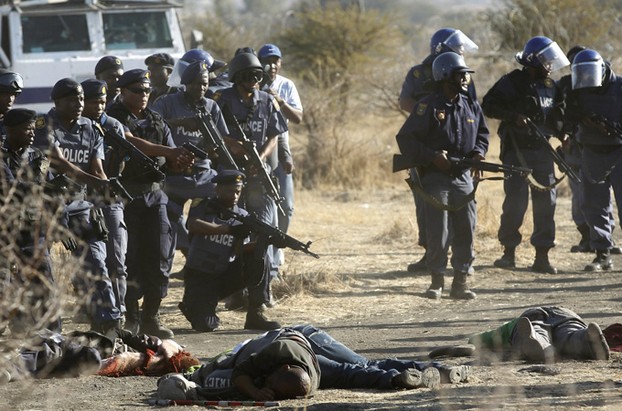
Original article: http://www.aljazeera.com/news/africa/2012/08/201281754353971991.html
Peter Burgess COMMENTARY (2012)
The phrase 'senseless violence' is used without thinking very much about what is involved. On the miners' side there is a very real issue of working conditions and wages. On the side of the authorities there are many agendas in play. For the police, it should be remembered that two policemen had been hacked to death a couple of days before ... but they did not come to this confrontation without someone doing a lot of thinking. The 'kettling' used by this police contingent was similar to the 'kettling' used by the New York Police Department (NYPD) it its crowd control as I have experienced with OccupyWallStreet. On the side of the labor movement there was conflict between two rival trade unions. On the side of mine management there was a pretty Dickensian approach to labor relations. Nothing in all of this was going well ... and the outcome was a natural result of huge incompetence on the part of leadership.
In particular, I am not at all happy with the leadership in the banking and corporate space. Investors and executives have behaved for the best part of 40 years in a way that has rewarded themselves at the expense of everyone else. This is likely to be a cause of more and more instability as time goes by. I am sorry to see a 'police' solution ... a violent police solution ... being deployed against what seems to have been a perfectly legitimate grumble by workers about their pay and conditions.
Peter Burgess COMMENTARY update (2023)
A lot of the optimism about the future that existed after the end of apartheid and the during the Presidency of Nelson Mandella and then the moral leadership of people like Desmond Tutu has evaporated in South Africa. There appears to be more corruption in high places now than there was a decade ago or two decades ago and much less global interest in South Africa than during the apartheid era.
Part of this is peculiar to South Africa, but much more is because Africa as a whole is being ignored by rich Western countries and while the need for development assistance and humanitarian aid may well be at record highs, the resources being made available have gone down significantly. None of this is good news for Africa.
Peter Burgess
Police chief says 34 dead and 78 injured in crackdown on striking workers at platinum mine in North West province.
AJE News Africa
Last Modified: 17 Aug 2012 at 12:49pm
South African police killed 34 people in a shooting at a mine in North West province, the country's police chief says.
Officers shot at the workers who were protesting on Thursday afternoon over pay at the Lonmin platinum mine in Marikana, some 100km northwest of Johannesburg.
The incident, which police said was an act of self defence, appears to be one of the bloodiest police operations since the end of white-minority rule in 1994 in Africa's biggest economy.
National Police Commissioner Riah Phiyega, speaking at a news conference on Friday, also said 78 people had been injured and 259 arrested in Thursday's violence.
'The police members had to employ force to protect themselves from the charging group,' she said. 'This is no time for blaming, this is not time for finger pointing. It is a time for us to mourn a sad and dark moment we experience as a country.'
But local newspaper headlines screamed 'Bloodbath', 'Killing Field' and 'Mine Slaughter', with graphic photographs of heavily armed police officers walking casually past the bloodied corpses of men lying crumpled in the dust.
In a front page editorial, The Sowetan newspaper questioned what had changed since 1994.
'It has happened in this country before where the apartheid regime treated black people like objects,' the paper said. 'It is continuing in a different guise now.'
Zweli Mnisi, the police ministry spokesman, said an investigation into the shooting has begun. Labour unions and political parties, including the ruling ANC, called for an independent inquiry.
Police investigators and forensic experts, meanwhile, combed the scene of the shooting, watched by about 100 people on Friday. South African media said that there was no more violence reported in the area overnight.
'Senseless violence'
Giving their version of Thursday's violence, police said up to 3,000 striking drill operators armed with machetes and sticks, and some with firearms, ignored orders to disperse.
The crowd had charged at the line of officers, but it remained unclear what prompted this behaviour, Mnisi, the police spokesman, said.
Witnesses said a water cannon, stun grenades and tear gas were first used to try and break up the crowd. The shooting happened after police failed to get the striking miners to hand over their weapons.
In an earlier statement, the South African Police Service said its officers were 'viciously attacked by the group, using a variety of weapons, including firearms. The police, in order to protect their own lives and in self-defence, were forced to engage the group with force'.
The incident, captured by Reuters photographers, drew condemnation from South African's main opposition party, the Democratic Alliance, social media users and evoked comparisons with apartheid-era brutality.
Jacob Zuma, South Africa's president, cut short a trip to a regional summit in neighbouring Mozambique to address the crisis.
On Thursday he said he was 'shocked and dismayed at this senseless violence' at the mine.
'We believe there is enough space in our democratic order for any dispute to be resolved through dialogue without any breaches of the law or violence,' Zuma said in a statement.
'We call upon the labour movement and business to work with government to arrest the situation before it deteriorates any further.'
The Sowetan reported on Thursday that police officers earlier said that negotiations with leaders of rival labour union Association of Mineworkers and Construction Union (AMCU) had broken down, leaving no option but to disperse strikers by force.
'Today is unfortunately D-day,' Dennis Adriao, a police spokesman, was quoted as saying on Thursday.
While the initial walkout and protest focused on wages, the ensuing violence has been fuelled by the struggles between the dominant National Union of Mineworkers (NUM) and the upstart and more radical AMCU.
Disputes between the two unions escalated into violence earlier this year at another mine.
'Illegal strike'
Roger Phillimore, Lonmin's chairman, issued a statement on Friday saying the deaths were deeply regretted. But he emphasised the mine considers it 'clearly a public order rather than a labor relations associated matter'.
Lonmin had announced on Thursday that striking workers would be fired if they did not appear at their shifts on Friday.
'The striking [workers] remain armed and away from work,'' the company said in a statement. 'This is illegal.'
The unrest at the Lonmin mine began on August 10, as about 3,000 workers walked off the job over pay in what management described as an illegal strike.
Those who tried to go to work on Saturday were attacked, management and the NUM said.
The rage became deadly on Sunday as a crowd killed two security guards by setting their car ablaze, authorities said.
Angry strikers on Monday killed two workers and overpowered police, leaving two officers dead, officials said.
Officers opened fire that day, killing three more people, police said.
Before Thursday's shooting, the protests and ensuing violence had killed at least 10 people in Marikana, including the two police officers.
It has also drastically affected production at the mine.
Some pictures from the scene of the Lonmin strike massacre
Policemen open fire on striking miners in South Africa
South African police check the bodies of striking mineworkers shot dead on Thursday.
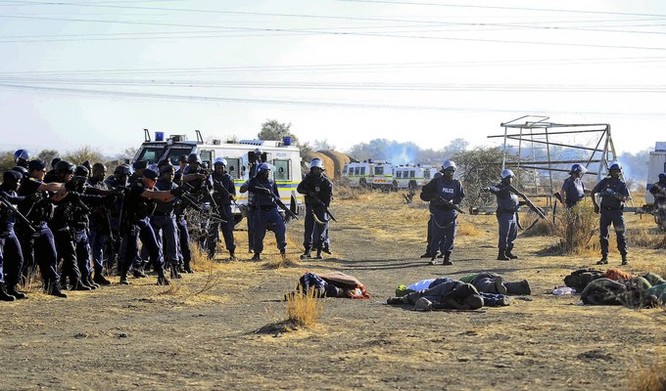
Policemen open fire on striking miners in South Africa
Several protesters were shot dead when police opened fire on the rowdy crowd.
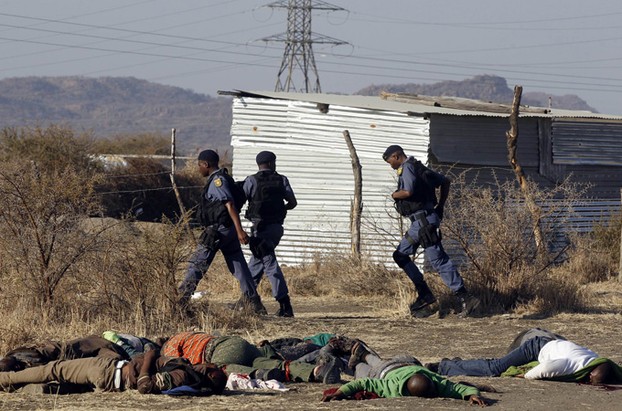
Policemen open fire on striking miners in South Africa
Police were prepared to use force to quell the ongoing protests, local media says.
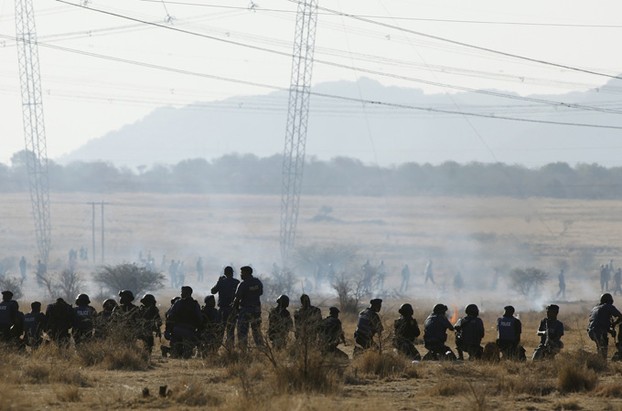
Policemen open fire on striking miners in South Africa
Protesters were carrying sticks and machetes, police say.

Policemen open fire on striking miners in South Africa
Unions allege that criminal elements are mostly to blame for the violence. Reuters/Reuters
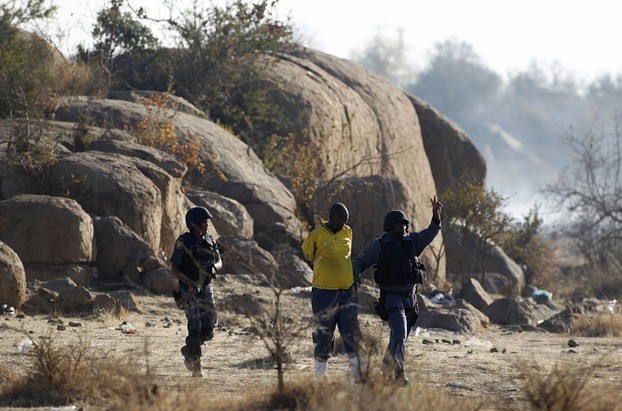
Policemen open fire on striking miners in South Africa
Dozens of casualties were reported. Reuters/Reuters
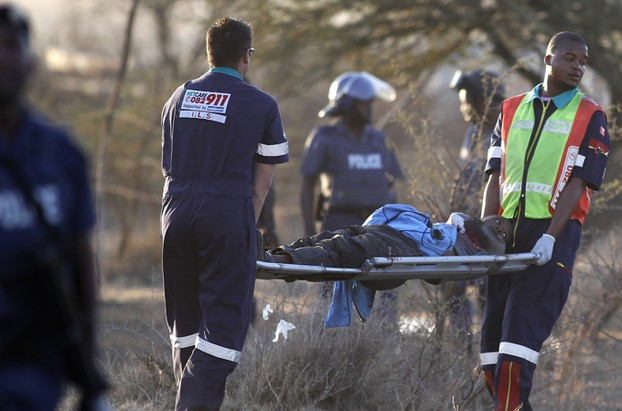
Policemen open fire on striking miners in South Africa
Striking mineworkers threw stones as police opened fire. Str/AP
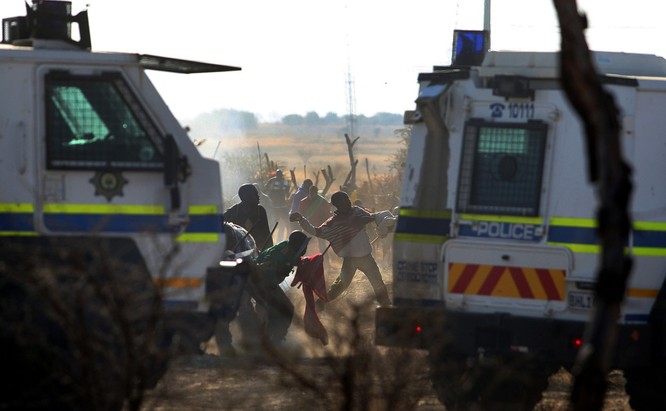
Policemen open fire on striking miners in South Africa
Police said they were acting in self defence when they opened fire.
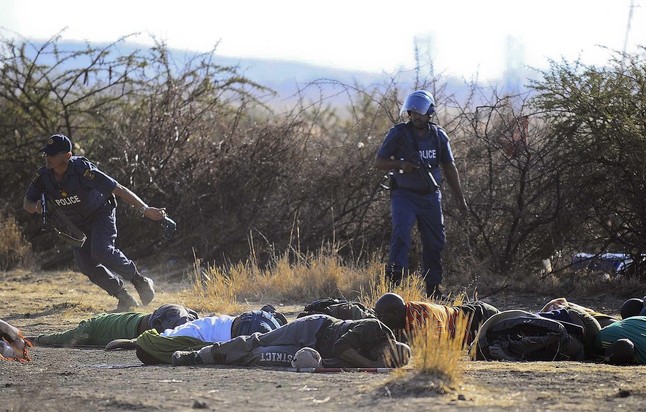
Policemen open fire on striking miners in South Africa
Police fired teargas and live ammunition at striking miners.
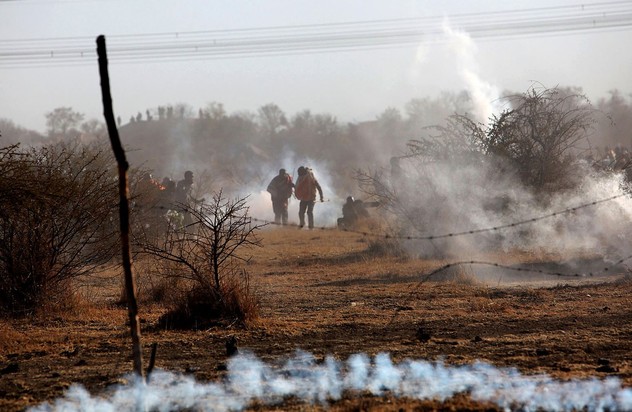
Policemen open fire on striking miners in South Africa
Striking mineworkers armed with homemade spears and pangas chanted slogans near the Marikana platinum mine.
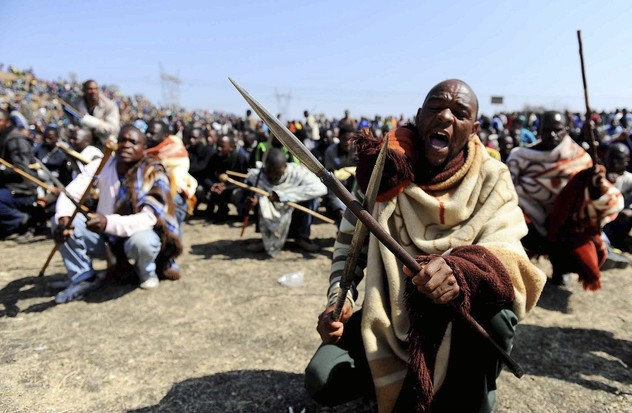
Policemen open fire on striking miners in South Africa
South African police check the bodies of striking mineworkers shot dead on Thursday.

Policemen open fire on striking miners in South Africa
Several protesters were shot dead when police opened fire on the rowdy crowd.

Policemen open fire on striking miners in South Africa
Police were prepared to use force to quell the ongoing protests, local media says.

Policemen open fire on striking miners in South Africa
Protesters were carrying sticks and machetes, police say.

Policemen open fire on striking miners in South Africa
Unions allege that criminal elements are mostly to blame for the violence. Reuters/Reuters

Policemen open fire on striking miners in South Africa
Dozens of casualties were reported. Reuters/Reuters

Policemen open fire on striking miners in South Africa
Striking mineworkers threw stones as police opened fire. Str/AP

Policemen open fire on striking miners in South Africa
Police said they were acting in self defence when they opened fire.

Policemen open fire on striking miners in South Africa
Police fired teargas and live ammunition at striking miners.

Policemen open fire on striking miners in South Africa
Striking mineworkers armed with homemade spears and pangas chanted slogans near the Marikana platinum mine.
